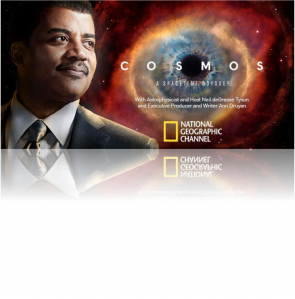Suggested Song: Knowledge, The Age of Information
Suggested Drink: Mad scientist cocktail, blueberry and raspberry schnapps, grenadine syrup, Bailey’s Irish cream
Information is not knowledge. – Albert Einstein
 We have been watching the new Cosmos series and enjoying it immensely. If there is a better show on television for kids and adults alike please clue me in. Neil deGrasse Tyson’s ability to boil down the complexities of science – from astrophysics to cell biology – and present them in digestible, fascinating one hour servings has kept us riveted during our Sunday night viewings; the most anticipated family moment in the Magill household since Mutual of Omaha’s Wild Kingdom!
We have been watching the new Cosmos series and enjoying it immensely. If there is a better show on television for kids and adults alike please clue me in. Neil deGrasse Tyson’s ability to boil down the complexities of science – from astrophysics to cell biology – and present them in digestible, fascinating one hour servings has kept us riveted during our Sunday night viewings; the most anticipated family moment in the Magill household since Mutual of Omaha’s Wild Kingdom!
In this age of hyper-connectivity we are bombarded 24/7 with news – this just in, still no trace of flight 370, and “I’m still sober” claims Lindsay Lohan – but are increasingly, appallingly weak in knowledge. As Tyson points out, this disconnect can be highlighted by our obsession with mass murderers like Adam Lanza but inability to identify science titans like Robert Hooke or appreciate the significance of Newton’s Principia (no Principia, no espresso, no auto, no weekend getaway to Paris on the high-speed train). Staying up to date is indeed useful, but with the tsunami of sensationalist news flooding our atrophying synapses continuously only the most disciplined internauts resist the barrage and reserve real time for real learning. (To counter your guilt I offer this fun video primer on the Mona Lisa, offered by the Louvre. Lots of other great free stuff there too!)
If news gives us breadth, then knowledge offers depth, expanding our appreciation for how things work, how cosmos – from the infinitely large to the atomically small – operate and interrelate, how to grow personally and create; knowledge gives us the tools and rules under which our Intérprize plans – our fabulous pursuits of passion – will be realized.
A man’s got to know his limitations. – Dirty Harry

The internet is a peerless resource, a seemingly boundless well of information, both enlightening and distracting. A challenge with its ubiquitous nature – for the internet is now being pushed out to our computers, televisions, phones, glasses, watches and automobiles, and moving quickly to most all other consumer electronics (the internet of things) – is our own submission to distraction. My resistance has its limits and at some point the headlines in commanding bold font about bawdy entertainers having a naughty night out, heinous crimes under investigation, last minute sports victories, and new restaurant or movie reviews break me down. At some point the internet is no longer our tool, we become the tool for advertisers and click through fees. Everything orbiting our universe serves as a personal anchor or sail, and at this point the value polarity of constant connectivity flips.
Acknowledging my own feeble restraint and keeping with the science theme I am conducting an experiment this week: no internet browsing period, and email checking – another bottomless black hole – is done just twice daily: before 9 a.m. and again after 5 p.m. Internet searching, on the other hand, is permitted as needed in the quest for helpful knowledge, like ferreting out the few historical references in this piece. For weekly news of world events I’m sticking to the Economist magazine, which I find balanced, comprehensive, and an effective sleep aid when administered just before bedtime. Local news is coming from La Provence, the daily bible best consumed with a late-afternoon pastis at one of the many cafes in the neighborhood.
Our parents grew up with the morning paper, the radio at noon, and the nightly news. They managed, despite the unthinkable handicap of no internet access, to grow economies and provide jobs, put men on the moon, cure cruel diseases like polio, and set their children up with better qualities of life than they themselves enjoyed. Can the internet generation claim the same?
Bill Magill
Aix-en-Provence
Nice piece this month on science always a big fan. See recent release movie Tim’s Vermeer. A tribute to human ingenuity with some optics involved
Thanks for the tip Bryan, I thought you would enjoy the post. FYI I worked with a startup in the optical tweezers space last weekend. Deep stuff!